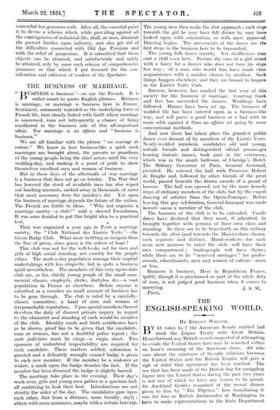THE BUSINESS OF MARRIAGE.
" nusiNEss is business"—so say the French. It is rather smart_to quote English •phrases. Business is marriage, or marriage • is business here in France.
Sentiment,: commonly regarded as the underlying force of French life, here closely linked with thrift where marriage is concerned, runs not infrequently a chance of being smothered in the businesS side of this all-important affair. For marriage is an - affaire and " business is business."
We are all familiar with the phrase un manage de raison." We _know in how business,-like a spirit such marriages are brought about, the parents or guardians of the young people: being the chief actors until the very wedding-day, and making it a point of pride to show themselves excellent men and women of -business.
But in these days of the aftermath of war marriage is a business that does not go on briskly. • The War that has lowered- the stock of available men has also wiped out banking accounts, sucked away in thousands of cases that most necessary item the maiden's dot. Yet upon the business of marriage depends the future of the nation. The French are fertile in ideas. " Why not organize a marriage society—a club?" said a shrewd Frenchman. It was soon decided to put this bright idea to a practical test.
Thus was organized a year ago in Paris a marriage society, the " Club National des Liseres Verts "—the Green Badge Club. What more befitting as insignia than the line of green, since green is the colour of hope !
This club was not for the well-to-do, not for men and girls of high social standing, not exactly for the peuple either. The work-a-day population manage their nuptial undertakings with less etiquette, but in quite a business spirit nevertheless. The members of this very up-to-date club are, so far, chiefly young people of the small com- mercial classes, employes, clerks, dactylos, &c.—a vast population in France as elsewhere. Before anyone is admitted as a member no small amount of business has to be gone through. The club is ruled by a carefully- chosen committee, a band of men and women of irreproachable-reputation. Upon special members thereof devolves the duty of discreet priVate inquiry in regard to the character and standing of each would-be member of the club. Identity cards and birth certificates have to be shown, proof has to be given that the candidate, man or woman, has not a doubtful police report ; the carte judiciaire must be vierge—a virgin sheet. Two sponsors of undoubted respectability are required for each candidate. These matters settled, admission is granted and a delicately wrought enamel badge is given to each new member. If the member be a widower or widow, a mark upon the badge denotes the fact. If the member has been divorced the badge is slightly barred.
The meetings take place in the evening. Their day's work over, girls and young men gather in a spacious hall, all contriving to look their best. Introductions are not strictly the order of the day. The candidates gaze upon each other, first from a distance, some timidly, shyly ; others with more assurance, maybe with a certain bravery. The young men then make the first approach ; each steps towards the girl he may have felt drawn to, may have looked upon with admiration, or with mere approval. Dancing begins. The movements of the dance arc the first steps in the business here to be transacted.
The young folk dance merrily. Yet degillusions may cast a chill even here. Picture the case of a girl seized with a fancy for a dancer who does not turn his steps her way ; of a man who would fain have made close acquaintance with a maiden chosen by another. Such things happen elsewhere, and they are bound to happen in the Liseres Verts Club.
Success, however, has marked the first year of this society for the business of marriage. Courting frank and free has succeeded the dances. Weddings have followed. Homes have been set up. The business of wedded life has been entered upon in a business-like Way, and will prove a good business or a bad with no more odds against it than an affaire set going by more conventional methods.
And now there has taken place the grandest public dance ever dreamt of by members of the Liseres Verts. Newly-wedded members, candidates old and young, outside friends and distinguished official personages bearing historic names, took part in the ceremony, which was in the smart ballroom of Claridge's Hotel. The Military Governor of Paris, General Gouraud, presided. He entered the hall with Princesse Robert de Broglie and, followed by other friends of the great world, passed beneath the drawn swords of a guard of honour. The ball was opened, not by the more homely steps of ordinary members of the club, but by the expert dancing of artistes from the Opera-Comique. Before leaving this gay celebration, General Gouraud was made honoris causa a member of the club.
The business of the club is to be extended. Candi- dates have declared that they must, if admitted, be brought together with persons of their own class and standing. So there are to be henceforth on this railway towards the altar (and towards the Mairie) three classes, each separate and distinct. Hand-workers—for such seem now anxious to enter the club—will have their own compartment ; tradespeople will have theirS ; while there are to be " reserved carriages " for profes- sionals, educationists, men and women of culture—more or less.
Business is business. Here in Republican France, ega/ite, though it is proclaimed as part of the whole duty of man, is not judged good business when it comes to














































 Previous page
Previous page